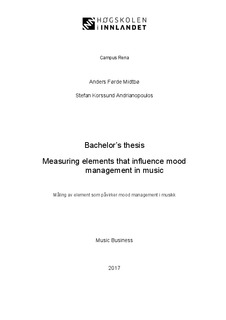Measuring elements that influence mood management in music
Bachelor thesis
Permanent lenke
http://hdl.handle.net/11250/2449771Utgivelsesdato
2017Metadata
Vis full innførselSamlinger
Sammendrag
In this paper, the reasons why someone uses music as a tool for mood management will be explored. The mood management theory derives from the idea that people would either subconsciously or to a lesser conscious degree choose music to enhance and/or optimize their mood (Zillmann, 1988). This was a theory that was first applied to entertainment in general and mostly focused on TV and movies. Later this has been applied to music, which is an especially interesting form of entertainment considering the vast accessibility the streaming technology provides. Our study will be based on previous studies and reputed theories.
To study this, a positivist deductive approach was applied with a quantitative method based around a survey with 3635 respondents over a broad geographical spread of Norway. The respondents were equally distributed among the sexes, with 49,1% men and 50,9% women.
Four elements from this survey were chosen and served as three independent and one dependent variable. These elements were escapism, music interest and cognitive listening.
Three different sort of analyses were performed to narrow the data and arrive at feasible conclusion. Factor analysis, correlation analysis, and a mulitple regression analysis. The reliability of the two sets of variables that were merged, mood management and escapist experience, were checked through a Cronbach’s alpha test. The overall results show that the three hypotheses made in this thesis were all validated through discarding of null hypotheses. These hypotheses were that escapist experience, music interest and cognitive listening individually all had a positive relation to mood management.
Beskrivelse
Bacheloroppgave i music business 2017
